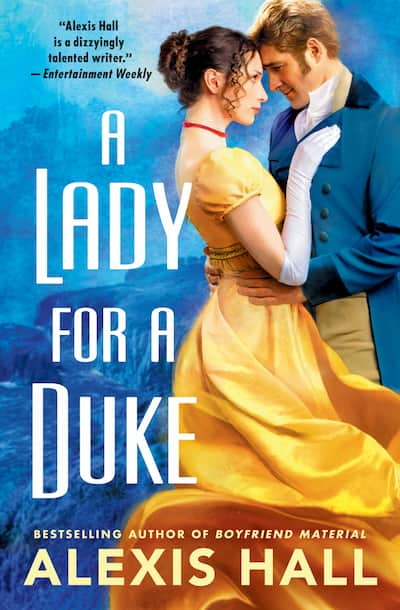Re-read 11/24. Drastic measures were needed after so many historical romance duds lately, especially with duke in the title. I wanted something full of sweeping romance on a foggy moor, angst and glory and tenderness. This was the safest bet possible.
I liked it the first time, but I loved it this time. Gracewood and his sister Miranda’s relationship stood out to me more than before, particularly how he has to unlearn the old patriarchal roles and see and hear her for who she is—an echo, of course, to his love story with Viola. He is the one expected to bear the responsibility for his actions, and to change—it’s not up to Miranda nor Viola to save him. Love and support him, yes. But neither the lover nor the sister must put their needs aside to tend solely to his.
Now that’s a breath of air, and a welcome one. Add that to the gorgeous… *gestures*… everything else, and it’s one of those small things that adds up to a quiet revolution.
Small acts of defiance, he well knew, could become great acts of rebellion, and little intimacies could become alliances or passions that shaped lives and worlds.
Pull quotes ⚭
“What other options? Men and women are permitted to interact in three ways: marriage, ruination, and polite indifference.”
She had such a compelling… he did not have the word for it. A completeness somehow, from the toes of her slippers to the curl of her hair. Had she been a man, he would have called her dandyish. Except that carried an implication of excess or absurdity, and she was neither. ((Okay, see, here is the correct way to reference a dandy, none of the gross insult involved.))
“In war we are all either meat or murderers.”
“Nobody is as they were,” she said. “That is what life is.”
It had never occurred to him to question beauty before. He’d always assumed it was obvious, fine eyes or a trim figure, rosebud lips or hair of whatever colour was currently fashionable. But it wasn’t. It was details. The way you could wait forever for the dimple to appear beside someone’s mouth, unable to imagine ever growing tired of seeing it.
“I could never marry you, Gracewood. The world—”
“Forgive my language, but”—his eyes were as steady on hers as the clasp upon her wrist, his mouth suddenly full of smiles— “fuck the world. I will change it for you if I have to.”
Except Viola was beginning to like Lady Lillimere too—her blunt speech and careless manners, the smile that rarely reached her eyes. There was a sense of stagecraft about her, somehow, guiding attention to the cards in her hand, rather than the ones up her sleeve. It made Viola feel oddly safe, this reminder that everyone lived their own illusions, chose their own truths, performed their own quiet magic before indifferent crowds.
“I am not sure love unshown is really love at all. What good does caring for a person do if you’re never there when they need you?”
Young ladies planning such adventures rarely undertake them while dressed as re-animated corpses.
“Now I find I have had my fill of a world that judges men by their capacity to hurt. You are not the villain of this story, Amberglass. You are no part of it at all.” ((I swear we better get the Amberglass book that AJH keeps promising. Or else.))
Bare of cloud and strewn with stars as thick as dust motes, the edges of the Milky Way glistening sharply like the interior of a geode. There was at once something taunting in such beauty— and consoling too.
“A man should not—” But then he stopped himself. Those words also belonged to an old life. “On second thought, fuck what a man should not. I’m grateful to you, Viola, for both your protection and your love.”
“I fear I shall never understand men. After all, if you turn down someone’s proposal of marriage when they haven’t abducted you, being abducted does not make you better disposed towards them.”
“You have nothing to be sorry for.”
“It’s hard not to wonder if I’ve been at fault somehow.”
“You have not,” Gracewood said firmly. “We tell ladies that their virtue is their shield, when it is no such thing. When the only true protection against the predations of powerful men is—”
“A pistol?” suggested Miranda.
“I was going to say a society of laws, the companionship of loyal friends, and a world that knows better.”
Viola had joined them upon the road. “A pistol may prove easier to come by.”
It was not an occasion to be sentimental. The night had been long and fraught and could have ended badly in so many ways. Could, in fact, end badly regardless. But still. What a marvel it was. What freedom. To be a woman unabashedly in love beneath a multitude of stars.
“She’s a seventeen-year-old girl,” protested the Viscount. “What can she possibly know about her own wishes?”
Gracewood’s gaze was as cold as winter seas. “More than you.”
She didn’t know why she hesitated. For once, it wasn’t to make sport of him. It was just so vast and consuming a question that to answer at once seemed almost disrespectful. More than that, it seemed a waste, to rush past the moment when she could savour it, cling to it, and watch the details of her future come together like a pattern beneath her needle.
